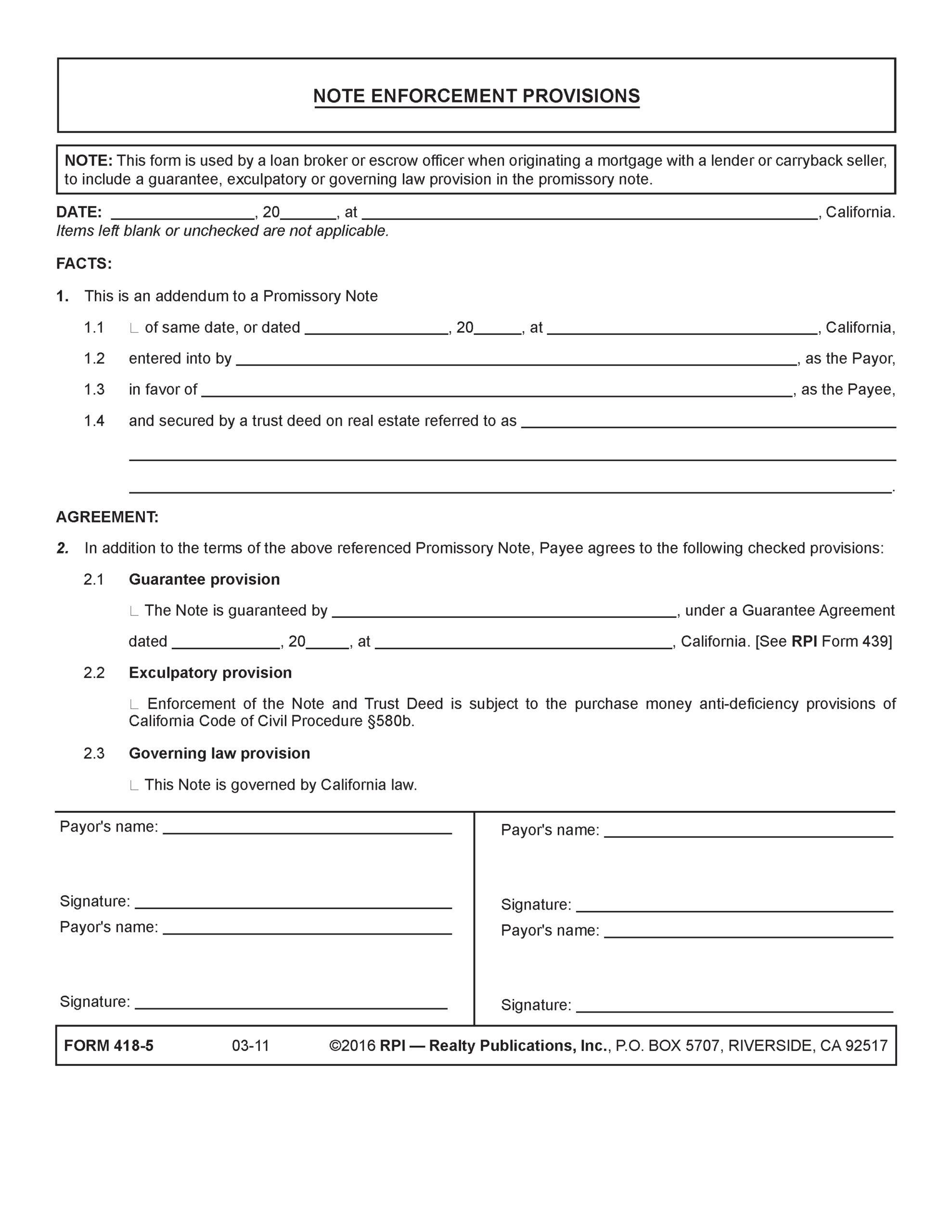This form is used by a loan broker or escrow officer when originating a mortgage with a lender or carryback seller, to include a guarantee, exculpatory or governing law provision in the promissory note.

Special provisions for a note
A note, sometimes called a promissory note, contains a borrower’s promise to pay the lender or carryback seller — the mortgage holder — the principal amount of the debt entered into, plus any interest. The note is a document and not the debt itself, but is evidence of the existence of a debt created in an underlying transaction.
In contrast, provisions in a trust deed, besides referencing the note and describing the real estate liened to secure payment of the debt, primarily address the maintenance and preservation of the mortgage holder’s security interest in the real estate. Together, the note and trust deed document is commonly called a mortgage.
Special provisions added to a note serve to:
- protect the mortgage holder against risk of loss resulting from late payments, early payoff or other defaults on repayment of the debt;
- comply with mortgage loan origination (MLO) rules for consumer mortgage transactions; and
- give the property owner payoff flexibility and limited liability.
Special provisions to be considered for inclusion in a note include:
- a prepayment penalty, when allowed [See RPI Form 418-2 §2.1];
- a due date extension [See RPI Form 418-3 §2.2];
- compounding on default [See RPI Form 418-1 §2.6];
- a final/balloon payment notice, when a balloon payment is included [See RPI Form 418-3];
- a grace period for payment and late charges [See RPI Form 418-1 §2.4];
- a payoff discount option [See RPI Form 418-2 §2.4];
- a right of first refusal on the sale of the note [See RPI Form 418-4];
- reference to a guarantee agreement [See RPI Form 418-5 §2.1];
- an exculpatory clause [See RPI Form 418-5 §2.2]; and
- governing law. [See RPI Form 418-5 §2.3]
Guarantee agreement with a third party
To further protect the mortgage holder from risk of loss due to a default on the trust deed note, the mortgage holder may require a third-party guarantor to become liable on a call, by the mortgage holder, for payment of all amounts due under the mortgage, called a put option.
By guaranteeing the mortgage debt, a guarantor agrees to buy the note from the mortgage holder in the event of default, a legal process called subrogation or equitable assignment.
The mortgage holder has three types of third-party assurances:
- a co-owner’s signature on the note and trust deed;
- a co-signer’s signature on the note only; or
- a personal guarantee of the note by someone other than the borrower.
When a third party signs the note, the third party becomes liable for repayment of the note, greatly limited by anti-deficiency rules protecting:
- co-owners on any type of property or method of foreclosure; and
- non-owner co-signers on a trustee’s foreclosure. [Calif. Code of Civil Procedure §580(b)]
When the mortgage is guaranteed, a provision is included in the note to reference the separate guarantee agreement. [See RPI Form 418-5 §2.1; see RPI Form 439]
By referencing the separate guarantee agreement in the note, everyone involved is on notice of any additional security for the mortgage as described in the guarantee agreement.
Exculpatory clause
An exculpatory clause in a note converts a mortgage holder’s recourse debt into nonrecourse debt.
When the carryback mortgage is either separately or additionally secured by property other than the property sold, the debt evidence by the note automatically becomes recourse debt. Thus, the buyer providing other security needs to consider negotiating for inclusion of an exculpatory clause as a provision in the note. [See RPI Form 418-5 §2.2]
When an exculpatory clause is included in a note, the mortgage holder may not obtain a money judgment for any deficiency in satisfaction of the debt on a judicial foreclosure of the mortgaged properties. Thus, the exculpatory clause in the note provides the buyer with anti-deficiency protection in a judicial collection effort.
Governing law
A lender or carryback seller involved in negotiating a mortgage with an out-of-state buyer needs to include a choice-of-law provision to assure judgments arising from disputes on the mortgage will be based on California law. [See RPI Form 418-5 §2.3]
When the state law to be applied is not agreed to, the state law applied will be based on the state with the greater interest in the result.
Editor’s note — The governing law provision has no impact on federal laws and regulations which pre-empt state laws.
Analyzing the Note Enforcement Provisions
A broker or escrow officer uses the Note Enforcement Provisions form published by Realty Publications, Inc. (RPI) when originating a mortgage with a lender or carryback seller. The form allows the broker or escrow officer to include a guarantee, exculpatory or governing law provision in the promissory note. [See RPI Form 418-5]
The Note Enforcement Provisions includes:
- a guarantee provision [See RPI Form 418-5 §2.1];
- an exculpatory provision [See RPI Form 418-5 §2.2]; and
- a governing law provision. [See RPI Form 418-5 §2.3]
The form is attached as an addendum to a promissory note.
Form navigation page published 12-2023. Updated 01-2026.
Form last revised 2016.
Form-of-the-Week: Further Encumbrance Consent, and Note Enforcement Provisions — Forms 410 and 418-5
Form-of-the-Week: Guarantee Agreement for Rental or Lease — Form 553-1
Article: Special provisions in a note
Client Q&A: What is a “due-on clause”?












